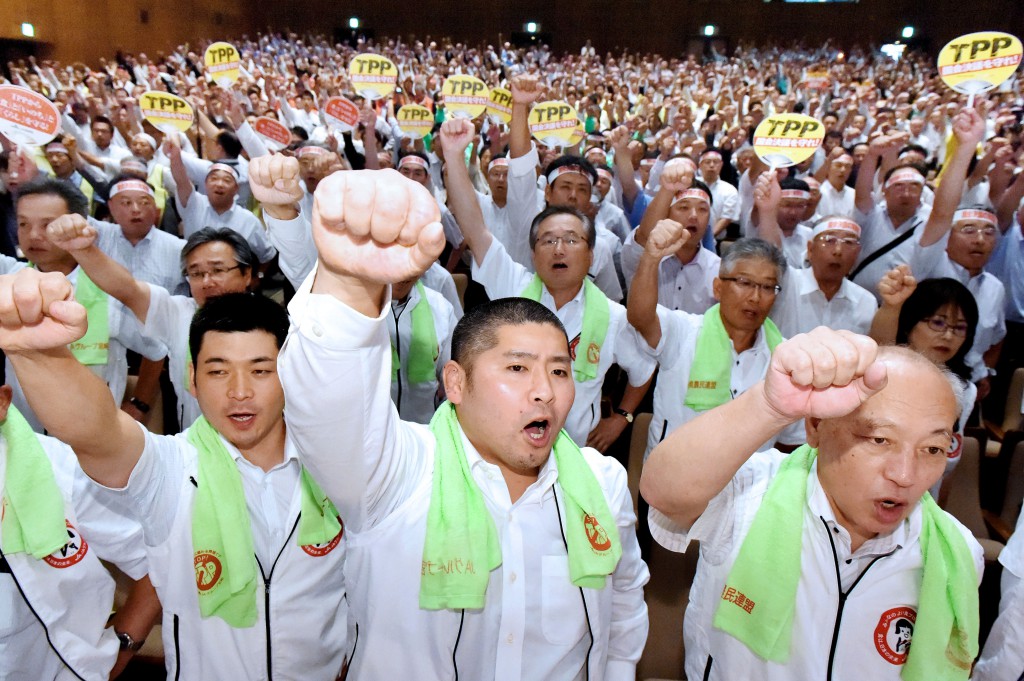
Participants shout three cheers at a rally against the Trans-Pacific Partnership free-trade talks held by agricultural organizations on Monday, July 27, in Tokyo
Some 1,500 people from the agricultural sector nationwide gathered on Monday, July 27, to urge the government not to make concessions in the Trans-Pacific Partnership free-trade talks. They called on negotiators not to aim for hasty conclusion of the talks, saying they should never cross the red line of going against the Diet’s resolutions of protecting key farm items.
The rally was held in Tokyo, co-sponsored by five national agricultural associations. “We want the government to put into practice what was approved by the Diet. That is all we ask for,” Toyokuni Kakurai, head of the national federation of farmers’ political organizations, said in an opening remark. Until now, such national rallies had been led by the Central Union of Agricultural Co-operatives (JA-Zenchu), but Kakurai said he agreed with JA-Zenchu President Akira Banzai that the federation would lead the meeting this time. “We demand that Japan and the United States not reach a bilateral agreement before others,” Kakurai said.
JA-Zenchu Executive Director Shigeshi Ohnishi said Japan is reported to be mulling making concessions regarding key products such as rice. He stressed that it is extremely important for the government to keep its promise in line with the Diet resolutions in order to realize its action plan to raise the nation’s food self-sufficiency rate.
Attendants of the rally claimed that by discussing increase in rice imports, the government is ignoring the Diet resolutions which call for exempting the product from negotiations so that it can continue to be reproduced. Others said the Diet resolutions should be the minimum requirement, and that the government should not proceed with the negotiations without disclosing information for the public to judge on.
Kazuhisa Shibuya, councilor of the Cabinet Secretariat who is in charge of TPP negotiations, explained that it cannot be denied that the negotiations are at a crucial stage. “However, we are not sure whether we will reach agreement. It will be a tough negotiation where national interests of the member countries clash,” Shibuya said. “We are well aware that the results of the negotiations should be something that can be approved by the Diet.”
Members of the ruling bloc also called on the government to stay firm on the negotiations. Hiroshi Moriyama, head of the Liberal Democratic Party’s committee dealing with the TPP talks, said an agreement on rice should not be something which affects the nation’s table rice market, emphasizing his determination to continue asking negotiators to protect key agricultural products so that they can be reproduced domestically. Noritoshi Ishida, head of Komeito’s agriculture, forestry and fisheries division, said the negotiations do not have a deadline and asked the government to keep the Diet’s resolutions.
Taku Eto, head of the LDP’s group opposed to the TPP talks, said he met Prime Minister Shinzo Abe on Thursday, July 23, and told him that the negotiators “should be ready to stomp out of the negotiation if the Diet’s resolutions cannot be accepted.” “We will continue taking a hard stance against the government,” Eto said.
The participants shouted three cheers led by Junya Amagasa, head of the national association of agricultural co-operative youth organizations, to unite under the goal of realizing the Diet resolutions.
(July 28, 2015)

